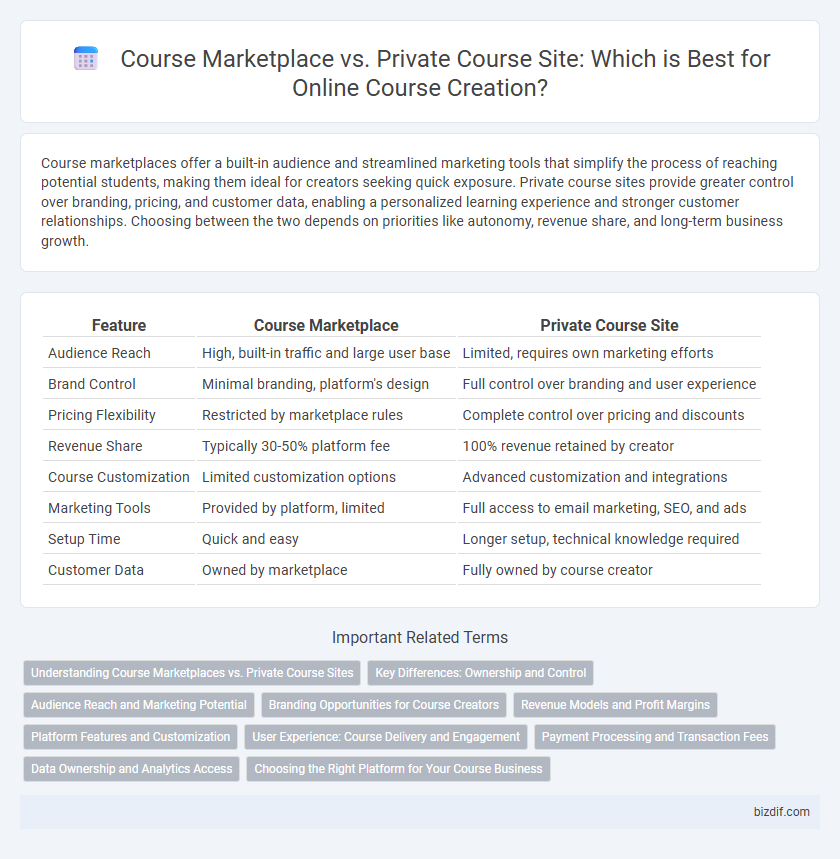Course marketplaces offer a built-in audience and streamlined marketing tools that simplify the process of reaching potential students, making them ideal for creators seeking quick exposure. Private course sites provide greater control over branding, pricing, and customer data, enabling a personalized learning experience and stronger customer relationships. Choosing between the two depends on priorities like autonomy, revenue share, and long-term business growth.
Table of Comparison
| Feature | Course Marketplace | Private Course Site |
|---|---|---|
| Audience Reach | High, built-in traffic and large user base | Limited, requires own marketing efforts |
| Brand Control | Minimal branding, platform's design | Full control over branding and user experience |
| Pricing Flexibility | Restricted by marketplace rules | Complete control over pricing and discounts |
| Revenue Share | Typically 30-50% platform fee | 100% revenue retained by creator |
| Course Customization | Limited customization options | Advanced customization and integrations |
| Marketing Tools | Provided by platform, limited | Full access to email marketing, SEO, and ads |
| Setup Time | Quick and easy | Longer setup, technical knowledge required |
| Customer Data | Owned by marketplace | Fully owned by course creator |
Understanding Course Marketplaces vs. Private Course Sites
Course marketplaces like Udemy and Skillshare offer broad audience access and built-in marketing tools, making them ideal for reaching diverse learners quickly. Private course sites provide complete control over branding, pricing, and customer data, enabling personalized user experiences and direct revenue streams. Selecting between these platforms depends on priorities such as market exposure versus ownership and customization of the course environment.
Key Differences: Ownership and Control
Course marketplaces provide a shared platform with broad audience reach but limited ownership and control over branding, pricing, and customer data. In contrast, a private course site offers complete ownership, allowing creators to customize design, set pricing strategies, and directly manage customer relationships. This autonomy in private sites enables stronger brand identity and long-term customer engagement compared to marketplace models.
Audience Reach and Marketing Potential
Course marketplaces offer extensive audience reach by providing access to a large, built-in user base, making it easier to attract learners without significant upfront marketing effort. Private course sites rely heavily on the creator's marketing strategies such as SEO, email campaigns, and social media to drive traffic and build an audience from scratch. While marketplaces benefit from higher organic visibility and trust, private sites provide greater control over branding and customer data, enhancing long-term marketing potential.
Branding Opportunities for Course Creators
Course marketplaces offer built-in audiences but limit branding through standardized templates and shared domains, reducing creators' control over their course presentation. Private course sites enable full customization of branding elements such as logos, color schemes, and domain names, enhancing brand recognition and customer loyalty. Maintaining consistent branding on private platforms helps establish a strong, unique presence crucial for long-term business growth.
Revenue Models and Profit Margins
Course marketplaces generate revenue through commission-based models, typically taking 20-50% of course sales, which limits profit margins but offers access to large, established audiences. Private course sites allow creators to retain 100% of sales revenue, enhancing profit margins but requiring investment in marketing and platform management to attract and maintain customers. While marketplaces provide ease of entry and built-in traffic, private sites offer greater control over pricing, branding, and long-term revenue growth.
Platform Features and Customization
Course marketplaces offer built-in audiences and streamlined marketing tools but limit customization with standardized templates and restricted branding options. Private course sites provide full control over design, user experience, and branding while requiring more investment in hosting, payment integration, and marketing strategies. Choosing between these platforms depends on prioritizing either ease of access to a broad audience or the flexibility to tailor course features and aesthetics to specific brand needs.
User Experience: Course Delivery and Engagement
Course marketplaces offer streamlined course delivery with built-in audiences and established engagement tools, ideal for course creators seeking quick exposure. Private course sites provide complete control over user experience, enabling tailored navigation, branding, and personalized interaction that can enhance learner engagement. Optimizing course delivery through features like progress tracking, interactive content, and community forums is crucial for maximizing retention and satisfaction in both environments.
Payment Processing and Transaction Fees
Course marketplaces handle payment processing and charge transaction fees ranging from 10% to 30%, depending on the platform, which can significantly reduce course revenue. Private course sites require integrating payment gateways like Stripe or PayPal, offering greater control over transaction fees that typically range from 2.9% plus a fixed fee per transaction. Choosing between these options impacts profitability, with marketplaces providing convenience but higher fees, and private sites offering lower fees but requiring more setup and management.
Data Ownership and Analytics Access
Course marketplaces offer limited data ownership and restricted access to learner analytics, as platform providers control user data and insights. Private course sites enable full ownership of customer information and comprehensive analytics access, empowering creators to tailor marketing strategies and improve course content effectively. This difference significantly impacts a creator's ability to leverage data for growth and personalized learner experiences.
Choosing the Right Platform for Your Course Business
Selecting the right platform between a course marketplace and a private course site depends on your business goals, target audience, and control preferences. Course marketplaces offer built-in audiences and simplified marketing but come with fees and limited customization, while private course sites provide full branding control, higher profit margins, and tailored user experiences at the cost of driving your own traffic. Evaluating factors like revenue share, marketing support, user engagement features, and scalability will guide you to the optimal platform for sustainable course growth.
Course marketplace vs Private course site Infographic

 bizdif.com
bizdif.com